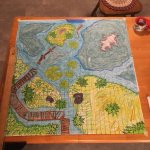Can we please just list out what is meant by protagonism concretely?
I've tried to explain this a million times.
In addition to Ovinomancer's literally two attempts, and Manbearcats figurative millions, I also posted this upthread:
To paraphrase
@Ovinomancer from post 112 upthread, what distinguishes these games is that
the player-authored dramatic needs of the PCs are the primary focus of play.
******************************************
Okay so if it's simply this... why do we keep mixing in the rules of other games, peoples preferred methodologies, and opinions into the mix?
It's impossible to discuss protagonistic RPGing without discussing procedures or methodologies of play, because these are inherent to the notion of
player-authored dramatic needs being the
primary focus of play. In the preceding sentence, the two italicised phrases are central to the notion of protagonistic RPGing, and also implicate some and exclude other procedures of play.
You can't have protagonistic RPGing if the GM has sole, unilateral authority over the content of the shared fiction. That's a statement of procedures. In the context of this thread, it is obviously related to the point of GM's notes. It bears upon who gets to tell us
what today's RPG session is going to be about, which bears upon the role of notes in determining what the session will be about. It bears upon the role of notes in framing, and in resolution.
The whole point of this thread is to discuss GMing techniques.
******************************************
If we are simply discussing the definition above and whether it is doable in D&D or many other traditional games (with the caveat that it's what a particular group wants to focus their game on) then I don't get how one can argue it's bad or unsuited for it.
Having done quite a bit of protagonistic play using a "traditional" RPG - namely, Rolemaster - I am pretty familiar with its limitations in this respect:
(1) It suffers from a lack of robust finality in non-combat resolution, although - in virtue of the design of many of its static action resolution tables - not quite as badly as non-skill challenge D&D resolution.
(2) It has many, many features that drag the focus of play away from the player-authored PC dramatic needs: spell durations, healing times, and the requirement that these impose to track time in a granular fashion and that make it hard to "close off" a scene.
(3) It has no clear procedures for resolving action declarations that involve large scale (in the fiction) space and time: travelling from A to B relies upon tracking movement on a map by applying movement rates and terrain modifiers; finding an armourer to sell you armour requires engaging with the fiction the GM narrates based on his/her map-and-key; etc. (It's no coincidence that in the RM games I GMed magical transport via teleport or flight became the default mode of moving from location to location and hence proceeding from event to event.)
Another "traditional" RPG that I know fairly well - namely, RuneQuest - suffers from a worse case of (1) (because it lacks the static action tables) and has a further limitation that is not present in RM:
(4) There is no real way, in RQ, for a player to "try harder" when the stakes are high (as determined by the PC's player-authored dramatic need). Magic is perhaps an exception to this, but it doesn't flow quite as easily as it does in RM, and RM has other mechanical features beyond spell use that permit trying harder.
There are probably other limitations I'm not thinking of right now, but those are some of the main ones.
Looking at "non-traditional" systems: Burning Wheel does not have (1), (3) or (4) and has some interesting ways of managing (2) by creating meaningful trade-offs around the passing of ingame time; Prince Valiant does not have (1), (2) or (3) and has a limited device - the Storyteller Certificate - for avoiding (4); Classic Traveller does not have (1) in its core activities of space travel, space trade, and fighting people and doesn't suffer too badly from (1) when it comes to talking to people, doesn't have much of (2) and doesn't have (3); AW and DW don't have (1), (2) or (3) and individual PCs may have individual moves that also avoid (4) at least in some contexts.
Based on my knowledge of 5e, it has (1) to about the same degree as RQ, mostly avoids (2) except in the context of resource recovery where the evidence of these boards is that that can be a huge issues, does have (3), and mostly deals with (4) via the magic system (the Inspiration subsystem often seems to be disregarded).
In any event, I don't believe that I have ever seen a single post on ENworld about 5e D&D play which provided an example of protagonistic RPGing using that system.
That's not to say that there are no black swans out there, but if you want to prove their existence can you at least point us to where they might be found?



